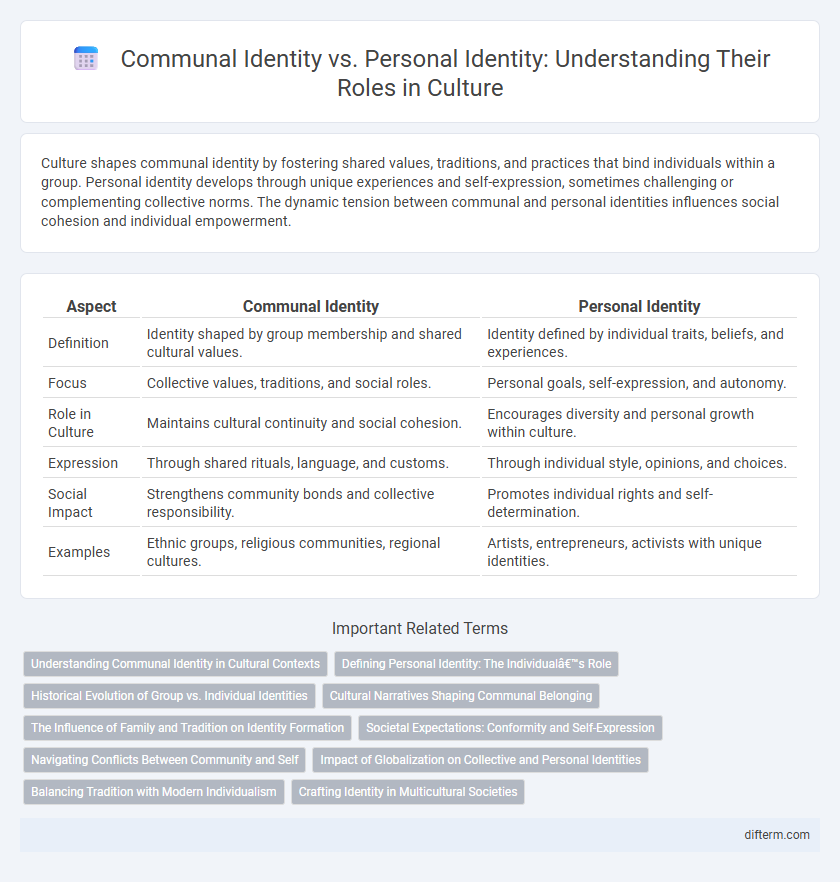Culture shapes communal identity by fostering shared values, traditions, and practices that bind individuals within a group. Personal identity develops through unique experiences and self-expression, sometimes challenging or complementing collective norms. The dynamic tension between communal and personal identities influences social cohesion and individual empowerment.
Table of Comparison
| Aspect | Communal Identity | Personal Identity |
|---|---|---|
| Definition | Identity shaped by group membership and shared cultural values. | Identity defined by individual traits, beliefs, and experiences. |
| Focus | Collective values, traditions, and social roles. | Personal goals, self-expression, and autonomy. |
| Role in Culture | Maintains cultural continuity and social cohesion. | Encourages diversity and personal growth within culture. |
| Expression | Through shared rituals, language, and customs. | Through individual style, opinions, and choices. |
| Social Impact | Strengthens community bonds and collective responsibility. | Promotes individual rights and self-determination. |
| Examples | Ethnic groups, religious communities, regional cultures. | Artists, entrepreneurs, activists with unique identities. |
Understanding Communal Identity in Cultural Contexts
Communal identity in cultural contexts is shaped by shared traditions, language, and collective values that bind individuals to a group, reinforcing a sense of belonging and mutual responsibility. This identity often emphasizes group harmony and social roles over individual preferences, promoting cohesion and continuity within communities. Understanding this dynamic is crucial for appreciating how cultural practices and collective memories influence self-perception and interpersonal relationships.
Defining Personal Identity: The Individual’s Role
Personal identity is shaped by an individual's unique experiences, beliefs, and values, distinguishing them within a broader communal context. It involves self-awareness and the conscious expression of personal choices, which may align or contrast with collective cultural norms. Understanding personal identity requires analyzing how individual autonomy interacts with social expectations to create a dynamic sense of self.
Historical Evolution of Group vs. Individual Identities
The historical evolution of group versus individual identities reflects a dynamic interplay where communal identity often provided social cohesion and collective security in early societies, while personal identity gained prominence with the rise of humanism and individual rights during the Renaissance and Enlightenment. In many cultures, communal identity was traditionally rooted in shared language, religion, and customs, reinforcing group solidarity and continuity over generations. Modern globalization and digital communication have accelerated the blending and negotiation of group and personal identities, challenging rigid boundaries and fostering hybrid cultural expressions.
Cultural Narratives Shaping Communal Belonging
Cultural narratives play a crucial role in shaping communal belonging by providing shared stories and values that foster a collective identity. These narratives, embedded in traditions, rituals, and symbols, create a sense of unity and continuity within communities. Communal identity often emerges from the collective memory and cultural heritage that individuals internalize, influencing their personal identity development.
The Influence of Family and Tradition on Identity Formation
Family and tradition play a crucial role in shaping communal identity by passing down shared values, customs, and beliefs that foster a sense of belonging within a cultural group. Personal identity, while influenced by these collective elements, develops through individual experiences and choices that may align with or diverge from familial expectations. The dynamic interplay between communal identity and personal identity highlights how ancestral heritage and cultural rituals contribute to an evolving self-concept rooted in both collective and individual narratives.
Societal Expectations: Conformity and Self-Expression
Societal expectations often drive individuals to conform to communal identity, emphasizing shared values, traditions, and collective behaviors that reinforce group cohesion. However, personal identity encourages self-expression, allowing unique traits and perspectives to flourish despite social pressures. Balancing conformity and individuality is critical for maintaining cultural harmony while fostering creativity and authenticity within communities.
Navigating Conflicts Between Community and Self
Navigating conflicts between communal identity and personal identity requires balancing collective values with individual desires, often leading to internal tension and social negotiation. Individuals may experience challenges when their personal beliefs or goals diverge from cultural expectations or group norms, influencing self-expression and social belonging. Understanding these dynamics fosters empathy and resilience, promoting harmony between community cohesion and individual autonomy.
Impact of Globalization on Collective and Personal Identities
Globalization intensifies the dynamic tension between communal identity and personal identity by facilitating cultural exchange and interaction across diverse societies. Exposure to global media, migration, and digital communication reshapes collective identities as communities adapt, resist, or hybridize traditions to maintain cohesion. Simultaneously, individual identities become more fluid, influenced by transnational values and personal experiences that challenge conventional cultural norms.
Balancing Tradition with Modern Individualism
Communal identity shapes cultural cohesion by reinforcing shared traditions, rituals, and collective values that preserve heritage across generations. Modern individualism emphasizes personal freedom, self-expression, and unique identity, challenging communal norms and encouraging innovation. Balancing tradition with individualism requires adaptive cultural frameworks that honor collective history while fostering personal autonomy and contemporary creativity.
Crafting Identity in Multicultural Societies
Crafting identity in multicultural societies involves navigating the complex interplay between communal identity and personal identity, where individuals balance cultural heritage with personal expression. Communal identity provides a sense of belonging and shared values rooted in ethnicity, language, and traditions, while personal identity emphasizes individual experiences, beliefs, and aspirations within diverse social contexts. This dynamic process fosters both social cohesion and cultural innovation, enabling people to negotiate multiple identities in an increasingly interconnected world.
communal identity vs personal identity Infographic

 difterm.com
difterm.com